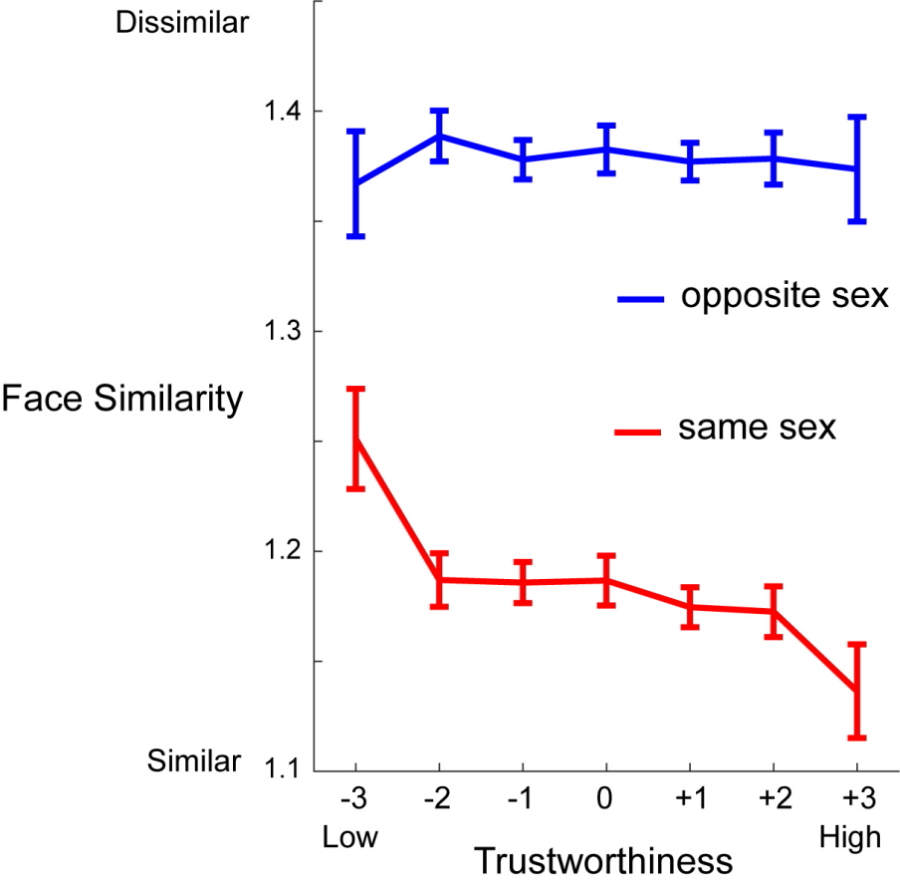You trust a face like yours
| Journal | Hum. Soc. Sci. Commun. 9:226 (2022) |
|---|---|
| Title | You trust a face like yours |
| Laboratory | Dynamic Brain Network Laboratory〈Prof. KITAZAWA Shigeru〉 |
Throughout history, people have been more likely to trust strangers who resembled them in appearance or demographics. But now, researchers from Japan have found that ratings of trustworthiness vary depending on the sex of the stranger and observer.
In a study recently published in Humanities and Social Sciences Communications, researchers from Osaka University have revealed that while resemblance of facial features plays an important role in ratings of trustworthiness by observers, this was only the case when the stranger was the same sex as the observer. When the stranger was the opposite sex, facial similarity had no effect on ratings of trustworthiness.
Given that the similarity between an observer’s face and that of another person is considered to influence perceptions of their trustworthiness, ratings of trustworthiness can be used to signal facial similarity. This is important because the specific qualities that are used to evaluate facial similarity, such as shape, size, and the position and structure of facial features, are unknown.
"Because trustworthiness can indicate a high degree of facial similarity, we wanted to examine how estimations of facial similarity made by a deep learning system were correlated with real-life ratings of trustworthiness," says lead author of the study Tamami Nakano.
To do this, the researchers asked a group of volunteers to view photos of faces of different individuals and rate their trustworthiness. Then, they used a deep learning neuronal network to determine the degree of similarity between each face photo and the face of each evaluator, and checked to see if the degree of similarity matched the ratings of trustworthiness.
"The results were surprising," explains Tamami Nakano. "While people tended to rate individuals with faces that were similar to themselves as more trustworthy, this was not the case when the faces were evaluated by someone of the opposite sex."
Thus, facial similarity is an important factor affecting social judgments for same-sex interactions.
"Our findings indicate that it is possible to quantify the degree to which two faces are similar or different via face recognition performed by an artificial neural network," says Takuto Yamamoto.
These findings have many potential applications for online technologies. For example, systems that can automatically estimate feature vectors from faces could make it possible to generate personalized suggestions and matches in things like peer to peer (P2P) lending, member matching in simple notification services (SNS), and the creation of avatars that look more trustworthy.
Abstract
The appraisal of trustworthiness from facial appearance of a stranger is critical for successful social interaction. Although self-resemblance is considered a significant factor affecting the perception of trustworthiness, research is yet to be conducted on whether this theory is applicable to natural unfamiliar faces in real life. We examined this aspect by using a state-of-the-art deep convolutional neural network for face recognition to measure the facial similarity of a large sample of people with the evaluators. We found that the more they resembled the rater, the more trustworthy they were evaluated if they were of the same sex as the rater. Contrarily, when the stranger was of the opposite sex, self-resemblance did not affect trustworthiness ratings. These results demonstrate that self-resemblance is an important factor affecting our social judgments of especially same-sex people in real life.

Fig. 1
Relationship between trustworthiness and face dissimilarity distance.
| Authors | Tamami Nakano (1, 2), Takuto Yamamoto (3)
|
|---|
